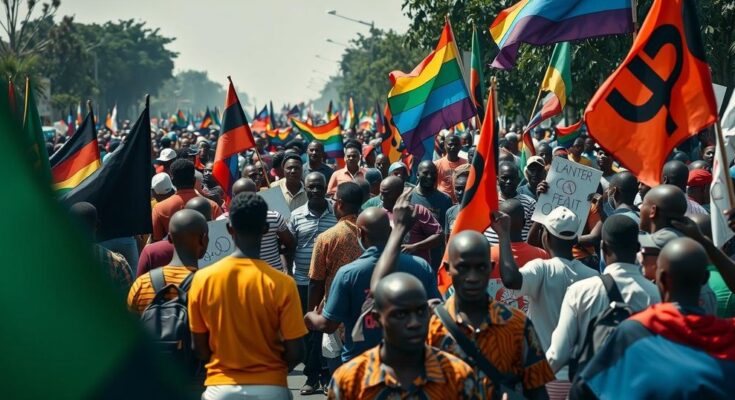In West Africa, protests against government policies are often met with brutal violence from law enforcement, resulting in numerous fatalities and injuries, particularly among youth. Amnesty International’s reports highlight how such actions demonstrate state weakness rather than power, amidst a climate of civic repression and denial of basic freedoms. The governments are urged to halt these violent practices to restore credibility and protect citizens’ rights.
In West Africa, participation in protests often poses significant risks to life and safety, as evidenced by a pattern of violent suppression of demonstrations by security forces. Reports by Amnesty International reveal a disturbing trend of excessive use of force during peaceful protests, highlighting that such brutality reflects a state’s fragility rather than its strength. Over recent years, numerous young men and women have been killed or injured while advocating for political and social changes across several nations, including Senegal, Guinea, and Sierra Leone, among others.
From March 2021 to March 2024, Senegal witnessed the deaths of at least 65 individuals during anti-government protests amid mounting tensions surrounding the presidential election. In Guinea, protests against governmental policies have claimed the lives of over 113 youths since 2019. A stark incident in Sierra Leone resulted in 27 fatalities, reflecting widespread discontent over rising living costs. The violent response from law enforcement in these instances underscores a broader, systemic issue of repression, as governments across the region suppress dissent and curtail civic freedoms, often framing their crackdowns as necessary actions against illegal protests.
In this context, repression extends beyond physical violence; political opposition and civil society organizations face growing restrictions, criminalizing peaceful assembly and detaining activists arbitrarily. For instance, authorities in Mali have suspended political party activities, while Guinea’s government issued a directive banning all demonstrations, thus stunting the democratic processes in these countries. Such measures create an atmosphere conducive to violence, as security forces operate with impunity and are emboldened by a lack of accountability for their actions.
Moreover, the legal frameworks governing the use of force are often ignored, as police and military personnel justify their actions by labeling protests as illegal or violent, disregarding the basic principles of necessity, proportionality, and precaution. Investigations into violations remain inadequate, as demonstrated by the lack of accountability in Guinea despite frequent promises of inquiry into unlawful killings.
The toll of this state-sanctioned violence is profound, with many families mourning lost loved ones and many youth left with lifelong injuries from encounters with law enforcement. Amnesty International’s reports illustrate the severe repercussions that marginalized populations face amidst these violent crackdowns. As families and communities bear the scars of government aggression, public trust in officials wanes, illustrating a crucial disconnect between governments and the governed.
Ultimately, the violence perpetrated by state security forces signifies a deeper instability within West African regimes. It reveals a failure to uphold human rights and an inability to engage constructively with dissenting voices. The region’s governments urgently need to foster an environment conducive to civil liberties, ensuring that law enforcement operates within the boundaries of law and respects human dignity, thereby restoring credibility and trust with their citizens.
The issue of police violence during protests in West Africa has garnered international concern due to the alarming frequency of fatalities and injuries among demonstrators. From live ammunition to tear gas and reckless police vehicle use, the tactics employed reveal a troubling approach to public dissent. As highlighted by Amnesty International, the systematic violence by security forces reflects broader governance failures across the region that undermine public confidence and democratic principles. The backdrop of civic repression, including curtailed freedoms and political crackdowns, further exacerbates tensions, resulting in a volatile environment for citizens wishing to exercise their rights to assembly and expression.
In summary, the ongoing violence inflicted upon demonstrators by law enforcement in West Africa epitomizes not the strength, but the inherent weakness of these state systems. The high casualty rates among peaceful protesters, coupled with a culture of impunity and repression, not only tarnish the legitimacy of regional governments but also alienate the populace they serve. As calls for justice and accountability grow louder, it is imperative for authorities to prioritize the protection of human rights, fostering a climate where dialogue and dissent can thrive without the threat of violence.
Original Source: www.amnesty.org



